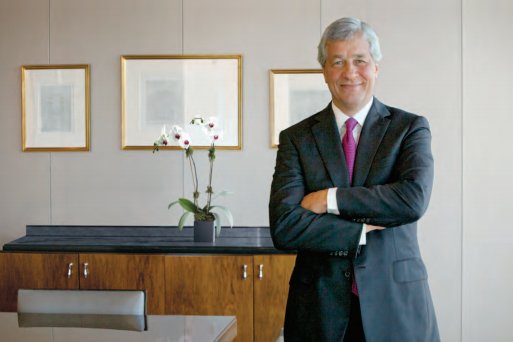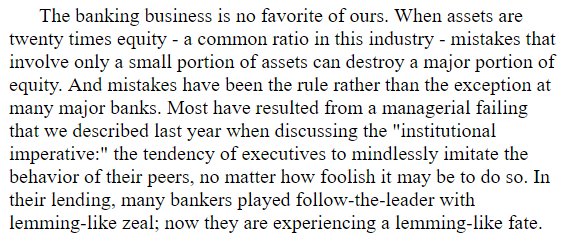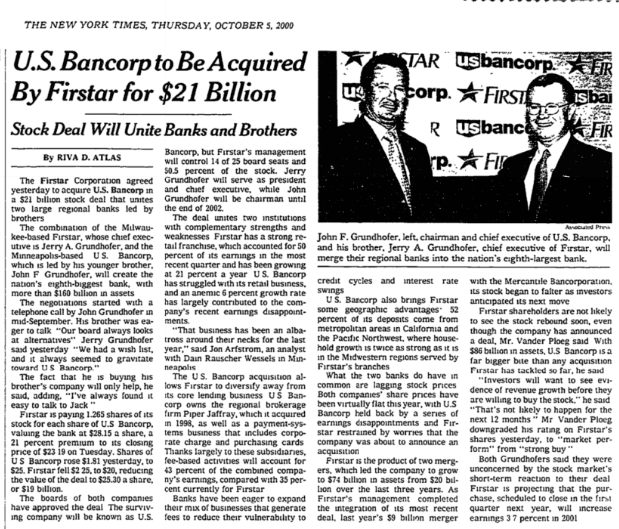
A THREAD ON EXTRAORDINARY BANKING...
Over the past year, I’ve talked w/ many of this era’s most accomplished bankers – Brian Moynihan, Richard Davis, Rene Jones, John Allison, Mick Blodnick, Joe Turner, Terry Turner, Scott Dueser, and others.
Over the past year, I’ve talked w/ many of this era’s most accomplished bankers – Brian Moynihan, Richard Davis, Rene Jones, John Allison, Mick Blodnick, Joe Turner, Terry Turner, Scott Dueser, and others.
I’m doing so in most cases for a book I’m writing on banking.
But also because I want to know what it takes to be an exceptional banker.
What unique traits and characteristics do they share that distinguishes them from others?
But also because I want to know what it takes to be an exceptional banker.
What unique traits and characteristics do they share that distinguishes them from others?
Most people don’t appreciate how hard it is to run an exceptional bank – one that generates superior returns through multiple cycles.
The leverage is so extreme and the credit cycle is so acute that there is basically no room for error.
The leverage is so extreme and the credit cycle is so acute that there is basically no room for error.
As @cwcalomiris points out in his book Fragile by Design, there have been major banking crises in 1837, 1839, 1857, 1861, 1873, 1884, 1890, 1893, 1896, 1907, the 1920s, 1930-33, the 1980s, the early 1990s, and 2007-09.
amazon.com/Fragile-Design…
amazon.com/Fragile-Design…
This is why an average of 110 banks have failed each year since the Civil War, when the modern American bank industry took shape. 

"No one has the right to not assume that the business cycle will turn! Every five years or so, you have got to assume that something bad will happen."
- Jamie Dimon
(via @duffmcdonald's book Last Man Standing)
- Jamie Dimon
(via @duffmcdonald's book Last Man Standing)

Warren Buffett made a similar point in his 1990 shareholder letter -- the year Berkshire Hathaway bought 10 percent of Wells Fargo.
berkshirehathaway.com/letters/1990.h…
berkshirehathaway.com/letters/1990.h…

The skills needed for a bank to survive and thrive with so much leverage in such a hostile environment, I’ve concluded, come from a combination of nature and nurture.
Some of the skills can’t be taught, as @HowardMarksBook explained to @TMFOtter of @themotleyfool:
“As they say in basketball, you can't coach height. No matter how good a basketball coach is, his players are not going to get any taller.”
“As they say in basketball, you can't coach height. No matter how good a basketball coach is, his players are not going to get any taller.”
https://twitter.com/TMFOtter/status/1052584931442987008
Great bankers are similar to great investors like Warren Buffett and Howard Marks in this regard, in that it takes the proper temperament to behave at the top of cycles and then capitalize on the mistakes of others at the bottom of cycles.
This is probably why Buffett is the country’s preeminent bank investor, holding major stakes in $BAC, $WFC, $USB, $MTB and others.
per @TMFMathGuy
fool.com/investing/2017…
per @TMFMathGuy
fool.com/investing/2017…
Yet, there is an element that can be taught -- or, perhaps more accurately stated, acquired.
Namely, if you educate yourself on cycles by reading history, you realize that while banking crises and panics may occur at irregular intervals, they are not irregular events.
Namely, if you educate yourself on cycles by reading history, you realize that while banking crises and panics may occur at irregular intervals, they are not irregular events.
Many dozens of books have been written about the history of cycles and banking, and I’ll be sharing these books in the coming weeks and months.
But one of the best is Mastering the Market Cycle by @HowardMarksBook.
amazon.com/Mastering-Mark…
But one of the best is Mastering the Market Cycle by @HowardMarksBook.
amazon.com/Mastering-Mark…
Marks is an aficionado of cycles.
No one articulates their dynamics better.
For bankers who want to be extraordinary, I highly recommend it.
No one articulates their dynamics better.
For bankers who want to be extraordinary, I highly recommend it.
• • •
Missing some Tweet in this thread? You can try to
force a refresh







